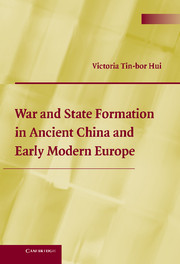Book contents
- Frontmatter
- Contents
- List of Tables and Maps
- Acknowledgments
- 1 A Dynamic Theory of World Politics
- 2 The Dynamics of International Politics in Ancient China
- 3 Rethinking the Dynamics of International Politics in Early Modern Europe
- 4 The Dynamics of State Formation and Transformation
- 5 Conclusion and Implications
- APPENDIXES
- Bibliography
- Index
1 - A Dynamic Theory of World Politics
Published online by Cambridge University Press: 02 February 2010
- Frontmatter
- Contents
- List of Tables and Maps
- Acknowledgments
- 1 A Dynamic Theory of World Politics
- 2 The Dynamics of International Politics in Ancient China
- 3 Rethinking the Dynamics of International Politics in Early Modern Europe
- 4 The Dynamics of State Formation and Transformation
- 5 Conclusion and Implications
- APPENDIXES
- Bibliography
- Index
Summary
This book originates from a peculiar puzzle: Why is it that political scientists and Europeanists take for granted checks and balances in European politics, while Chinese and sinologists take for granted a coercive universal empire in China? This research question is not as odd as it appears because China in the Spring and Autumn and Warring States periods (656–221 bc) was a multistate system that closely resembled Europe in the early modern period (ad 1495–1815). Although it is often presumed that China or Zhongguo refers to the “Middle Kingdom,” this term originally referred to “central states”: zhong means “central” and guo means “states.” As the early modern European system did, the Zhongguo system experienced disintegration of feudal hierarchy, prevalence of war, conditions of international anarchy, emergence of sovereign territorial states, configuration of the balance of power, development of the centralized bureaucracy, birth of state-society bargains, expansion of international trade, and other familiar phenomena of international and domestic politics. If the balance of power prevailed in international politics and the constitutional state triumphed in state-society relations in Europe, then why did the opposite outcomes occur in ancient China? Is it because China was destined to have authoritarian rule under a unified empire as taught in standard Chinese history books? Alternatively, is it possible that the European trajectory was far more contingent than is presumed by the Eurocentric perspective?
- Type
- Chapter
- Information
- Publisher: Cambridge University PressPrint publication year: 2005



